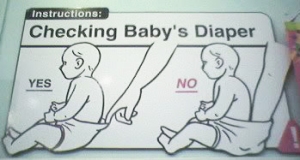Parenting experts abound on the internet, in bookstores and over the airwaves. How is a parent to judge what is sound versus problematic advice, especially when experts disagree? As a way of helping you to judge whether experts are worth paying attention to, I’ve developed these 10 guidelines. As the consumer-parent you can recognize the value of an expert’s advice based on how well she or he complies with these guidelines. (I mean these guidelines for those who offer counsel to parents secondary to their professional qualifications. I do not mean these guidelines to be for parents, or other lay people, who are simply sharing their experience and trying to be helpful in the best way that they can. )
- Try not to act holier than thou or imply such. All parents make mistakes (i.e., have performance deficits). By trying to help parents to learn things that are helpful (i.e., to correct for knowledge deficits), and to minimize performance deficits, it’s easy for parenting experts to come across as holier-than-thou. This is why I believe it ‘s highly advisable for experts to share their own stories of vulnerability and to repeatedly make the point that we all have off days and ineffective moments.
- Try to make sure that your recommendations have solid research support in peer-referred journals. It’s so easy to be arrogant, to stop reading and to fall in love with one’s own insights., experience and perspectives. It’s much harder to be humble, nuanced and knowledgeable about the state of our parenting science. We all do well to put in the effort to know the evidence and to craft our recommendations based on such.
- Avoid impractical counsel. Parents live super hectic lives these days. So much of what would probably be helpful might be far from practical for contemporary parents. Effective parenting experts are also efficiency experts.
- Offer suggestions that are more likely to yield a bigger bang for the parent’s invested time and effort. Tolstoy put it well “happy families are all alike, every unhappy family is unhappy in it’s own way.” Tolstoy’s wisdom is supported by our empirical science. Effective parenting experts try to focus on the more important strategies and issues.
- Try to be edutaining. It’s possible to entertain without educating, but it is very hard to educate many without also being entertaining. Effective experts invoke laughter, share interesting stories, promote emotional experiences and otherwise engage audiences as they teach.

- Support the finding that parents are like shepherds, not sculptors. So much of how our kids act, what they feel and how they think is influenced by their temperament (i.e., biologically based personality attributes). For instance, about 50% of how happy people are is determined by their “set point” which is heavily influenced by temperament. (I know each of my 3.0 children could not have been more different from each other before my wife and I had any opportunity to mess them up.) Experts know this and don’t create needless pressure and guilt in parents by suggesting or implying otherwise.
- Acknowledge, and integrate into your counsel, the truth that each parent numbers among the world’s leading experts on his or her child. Our job is not to try to replace parent intuition or to shout it down but to partner with it. This is more difficult to do when the information flow is one way, such as in a book. However, effective experts counsel parents to consider their intuition and knowledge of their child as an essential part of decision-making.
- Be empathic. The vast majority of parents I’ve met love their child more than their own life. Is it possible to love more? For this reason, when parents act in an ill-advised or hurtful fashion it’s usually for understandable reasons. To understand these reasons is not to justify the behavior, but it does make it less likely that one will scold or shame a parent. This stance also recognizes that a harsh judgment indicates incomplete knowledge. Moreover, It’s much more difficult for me to offer helpful and effective counsel unless I can “feel” what it’s like to be in the other person’s shoes. To be empathic is to be objective and scientific as each engages a search for truth.
- Promote the message that child wellness is intimately linked to parent wellness. It’s so easy to focus on what parents can do for their children and lose site of the fact that it’s much harder to act with intention if one is overwhelmed or fatigued; this is why airline attendants counsel adults traveling with children to put their own masks on first before their child’s. Martyrdom works for establishing religions and governments but it rarely works in families.
- Encourage parents to understand the incredible power of effective shepherding. The high points of the relevant scientific literature makes it clear that parents have tremendous power to promote happiness and wellness both in themselves and in their families. This is where your role can be so very helpful: parents really benefit by receiving the best information and just a little bit of air under their wings.
It is my intention to make this blog consistent with these 10 guidelines while also recognizing my fellow parent’s capacity for lunacy (i.e., to be made crazy by the intense love felt for one’s child–please see the preceding post).


Comments
Dr. David Palmiter,
I found your thoughts on co-lunacy refreshing. It is not often that I realize how helpless or lost we feel, not only as profesisonals, but as parents. Having a place to normalize our feelings and accept these realities encourages me to learn more about tips, facts, and cues to help me be a better parent. !! Thanks for starting this blog!!